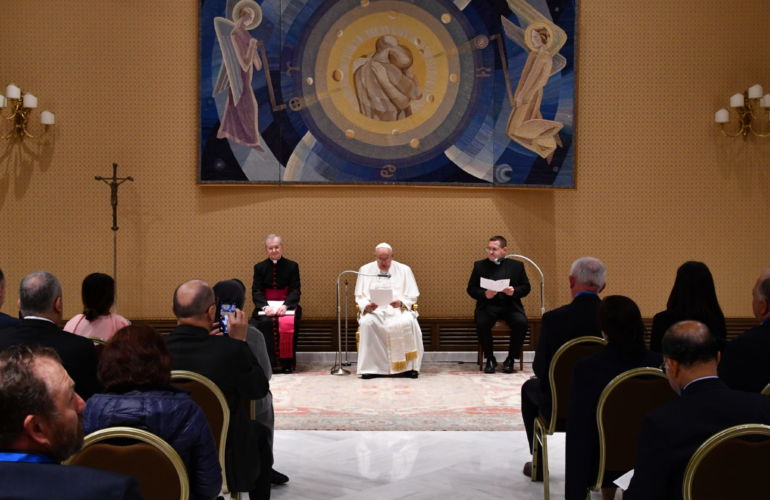Reflections of 21 October on a Third Visit to Ukraine During a Time of War

21 October 2023:
Our first meeting in Odesa was with Fr. Oleksander and Rostic of the Stella Maris Apostolate with seafarers. They told us of the tremendous challenge posed by the war on the merchant marine industry. Ukraine has the largest seafarer representation in the world, with 150,000 women and men working in this commercial field. The Stella Maris Centre is located on what was the main pedestrian thoroughfare for the seafarers to cross from the port to the centre of town. In the past, many seafarers would stop in to socialize, talk with the pastoral ministers, unburden their consciences through the sacrament of Penance (confession of sins), pray, or simply seek some solace, silence, and peace after experiencing crowded and pressurized work and living conditions onboard ship. At the beginning of the war, the Stella Maris chaplains played a crucial role as intermediaries between the seafarers and their families. Some seafarers were stuck onboard ships, and Stella Maris provided them with food, medicines, and hygiene products. The chaplains also attended to the needs of the wives and children of these seafarers. Now, most have returned home, but they are suffering greatly because of the lack of regular employment –some have joined or been drafted into the military. Others have taken on part-time and/or irregular jobs, but they are desperate to find ways in which they could ensure the well-being of their wives and children.
In case you are not familiar with Stella Maris or the “Apostleship of the Sea,” here is how this movement is described on the Stella Maris –United Kingdom website:
“In October 1920 in Glasgow Apostleship of the Sea (now known as Stella Maris) was established to support seafarers in need. 100 years later we are the largest ship visiting network in the world, providing seafarers with practical and pastoral support, information, and a friend in times of need.
The Apostleship of the Sea was founded in Glasgow in 1920. At this time, Britain had one of the largest merchant fleets in the world, employing many thousands of British seafarers. The Apostleship of the Sea ran large seafarers’ hostels in all the major port towns where seafarers could stay while their ships were in port, often for weeks at a time. Hundreds of volunteers from the local parishes were involved in providing hospitality and entertainment for seafarers in these hostels, which were always full.
Over time, the Apostleship of the Sea grew into a worldwide pastoral and welfare organization with 80 functioning centres by the end of World War II.”
Since February 2022, Stella Maris has been an active member of our Catholic Response for Ukraine Working Group, so I firmly committed myself to visit them in Odesa, Ukraine –a promise that I was finally able to fulfill!
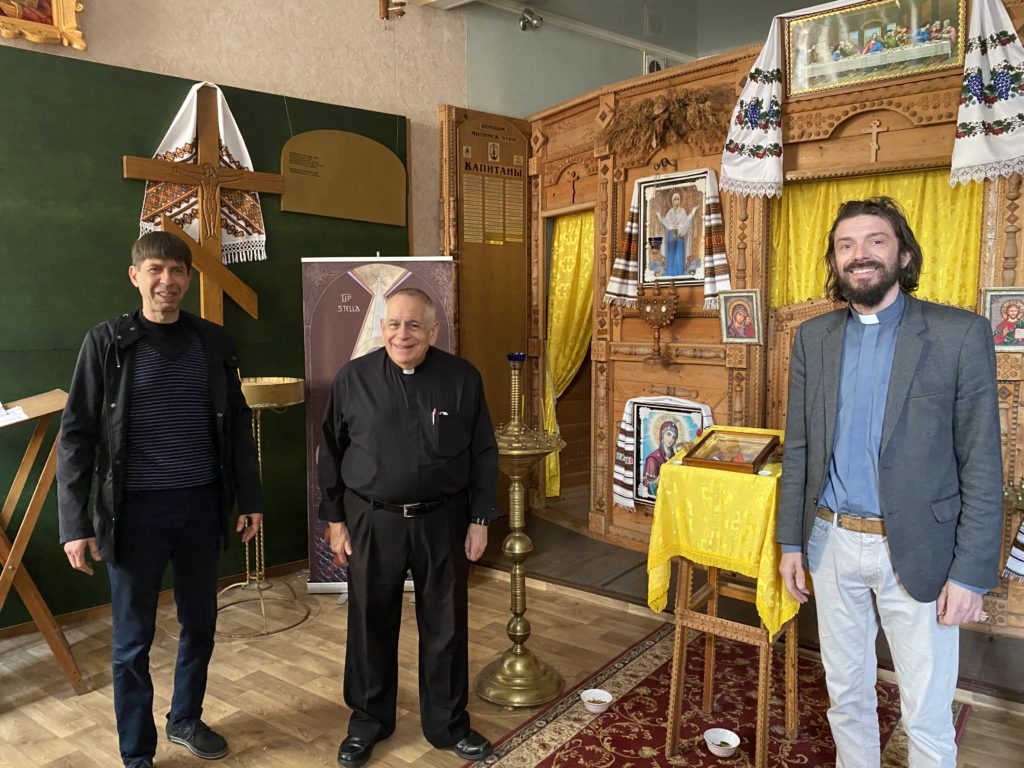
At the present time, there are not so many visitors to this Centre since the passageway between the port and the city centre is closed and heavily guarded. This area has been, and continues to be, heavily shelled by the Russian military –the windows in every building on the street have been shattered –but no window has been damaged at the Stella Maris! Our Blessed Lady, Mary, who is known in Catholic Church tradition as Star of the Sea –Stella Maris, in Latin –is taking care of her chaplain, who in turn provides listening ears, practical help, and prayers for and with those whom they serve.
Then, we visited Fr. Piotr Rosochatski from the Latin Catholic Caritas Spes Odesa. The national director of Caritas Spes asked me to bring special greetings to this brother priest. When I told him this, Fr. Piotr smiled and responded, “I’m glad to hear that our national office is thinking about us!” Fr. Piotr focused both on the internally displaced persons who poured into Odesa immediately after the 2022 invasion of Ukraine. Like his counterparts in Kyiv, Fr. Piotr told us that the humanitarian assistance needs overtook all other activities of his agency. Previously, Caritas Spes Odesa prioritized its work with emotionally and physically challenged children –and only now, one year later, Fr. Piotr and his colleagues have been able to return to such sensitive and positive services. The priest proudly showed us the pottery made by such children; he spoke of the progress made by the children when they worked out their physical and mental challenges by their molding of clay. Fr. Piotr said, with a big smile, that pottery-making is an art “with a conscience” since, before putting your product in the pottery oven, you could always re-mold and cover over any mistakes or deficits that otherwise would show up in the finished product. I was conscious of Fr. Piotr’s deep insight into the children with whom he works –he is trying to mold them in a way that they could feel and take action on the special dignity that God has shared with them –even as they struggle with the challenges of everyday life –especially a life that unfolds in a situation of war and insecurity.
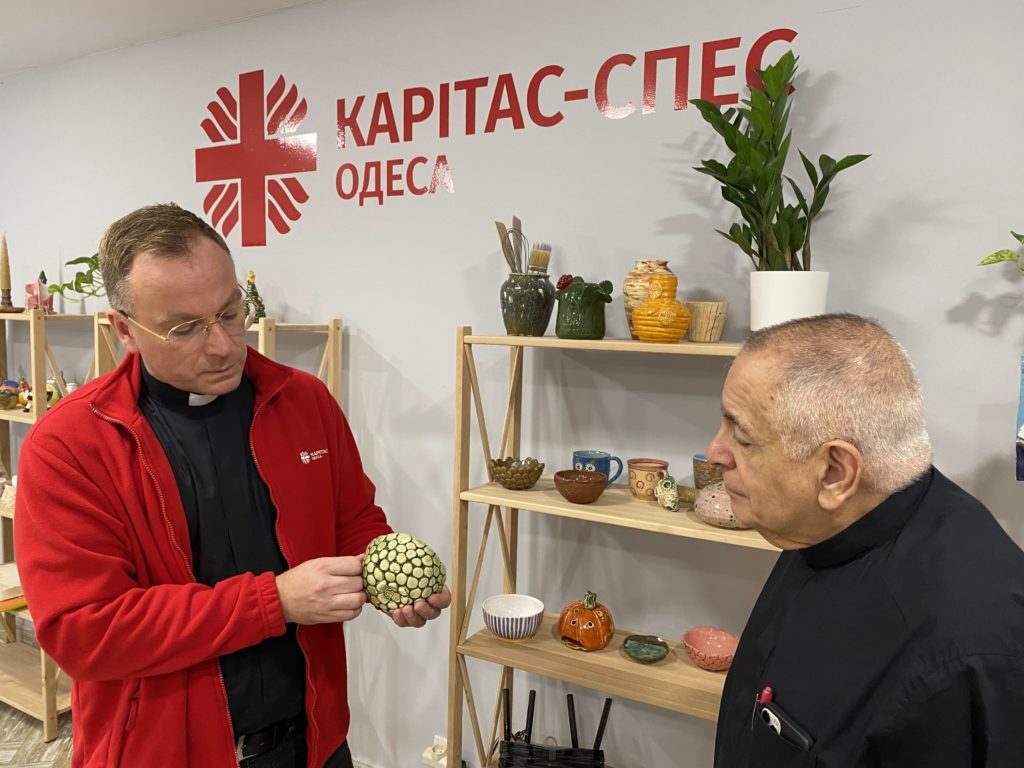
We then proceeded to the Greek Catholic Cathedral of Odesa, where the Exarch (Bishop) Mykhaylo Bubniy greeted us with an embrace of peace and joy. He thanked us for being “courageous” enough to come to Odesa despite the many missile alerts and invited us to pray with him as we entered his very small Cathedral, which is not much larger than the living room in most homes or apartments. He also shared his dream that, one day, he would be able to build an edifice that is much larger and where God’s praises could be sung on a grander scale. He spoke of the many parishioners who fled Odesa in the beginning of 2022 –in turn, he and his priests, Religious Sisters and Brothers, and his faithful laypeople reached out to receive many newly arriving internally displaced persons, coming especially from areas that had been taken by the Russian military or that were on constantly changing demarcation lines between the invaders and the Ukrainian military. Many of those contested regions are located in this diocese; you may be familiar from regular media news reports on Mykolaiv, Kheerson, etc.
Bishop Mykhaylo smiled when he told me that many of the displaced persons seeking aid were not Catholic and a good number were non-believers, but many have joined the Church because they found a new “family” in the Catholic Church –even though the aid was offered to them without any special expectations or pressure to become Catholic. After our joint prayers and updates from Bishop Mykhaylo, he honored me with an invitation to sign the Gospel book placed on the Cathedral altar. I did so in the name of all the governance officials, staff, volunteers, and generous donors associated with ICMC and assured the Bishop and the faith-filled flock that he shepherds our prayers and solidarity and hopes that peace will soon return to Ukraine.
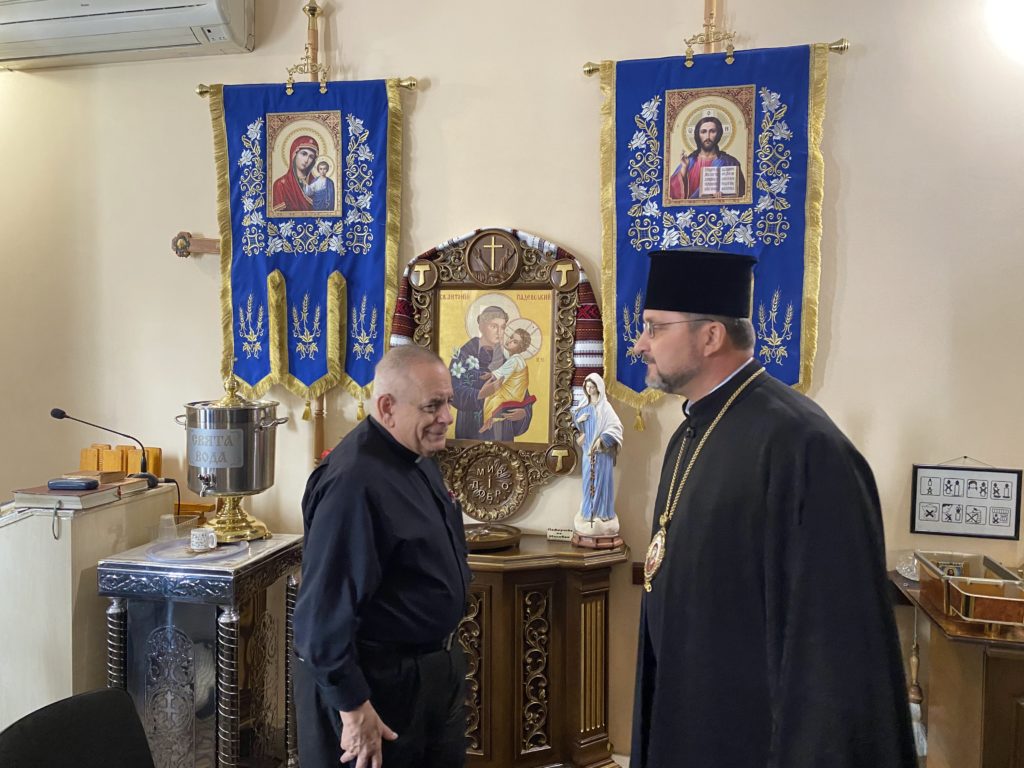
Bishop Bubniy then accompanied us to the office of the Greek Catholic Caritas Odesa, where we were impressed with the enthusiasm of the staff despite the constant demands placed on them for humanitarian assistance. They spoke of registering internally displaced persons, giving them material assistance, and helping children from tender age up to adolescence to learn, play, and form positive relationships. We walked in on a puppet workshop, heard about their outreach to elderly persons who are left in villages without family support, and new long-term care facilities which have been set up to protect aging persons but also to help them enjoy whatever years that are left to them on this earth. The staff was especially proud of the cooking competitions and recipe exchanges among women, about the construction of robots among young people, and the list went on during a lengthy but fascinating presentation of “every day in the life of Caritas Odesa!” Most striking to me was the sensitivity of Bishop Mykhaylo to the emotional needs of the Caritas beneficiaries. But, then again, these Caritas Odesa photos tell more than any words that I could write :
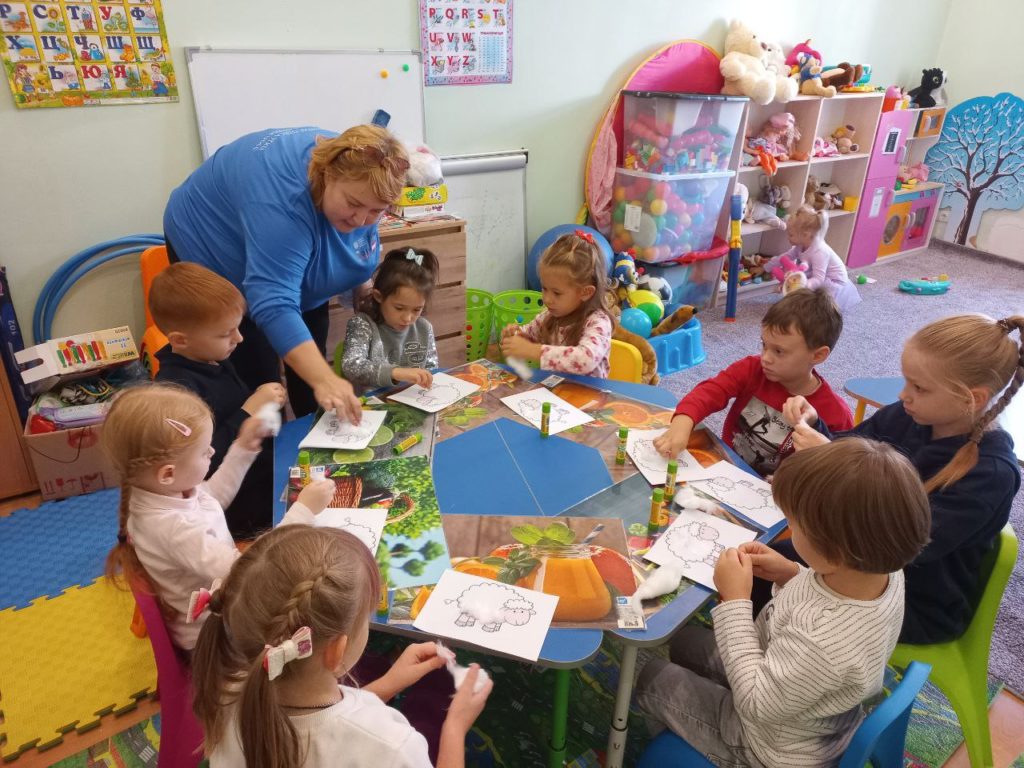
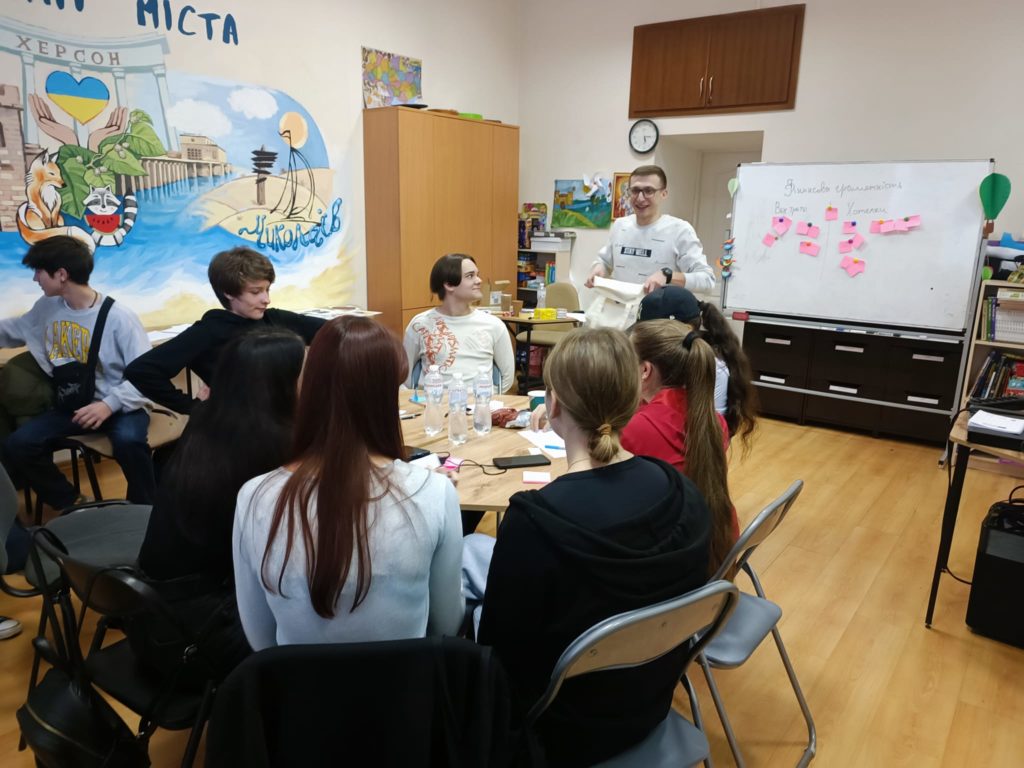
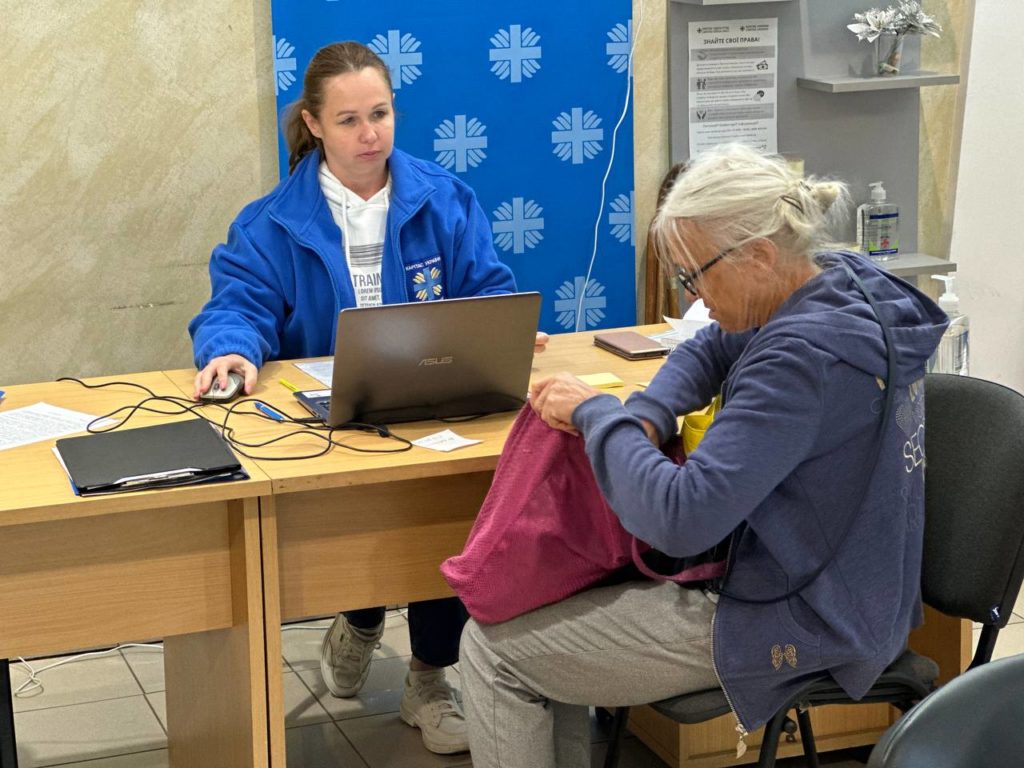
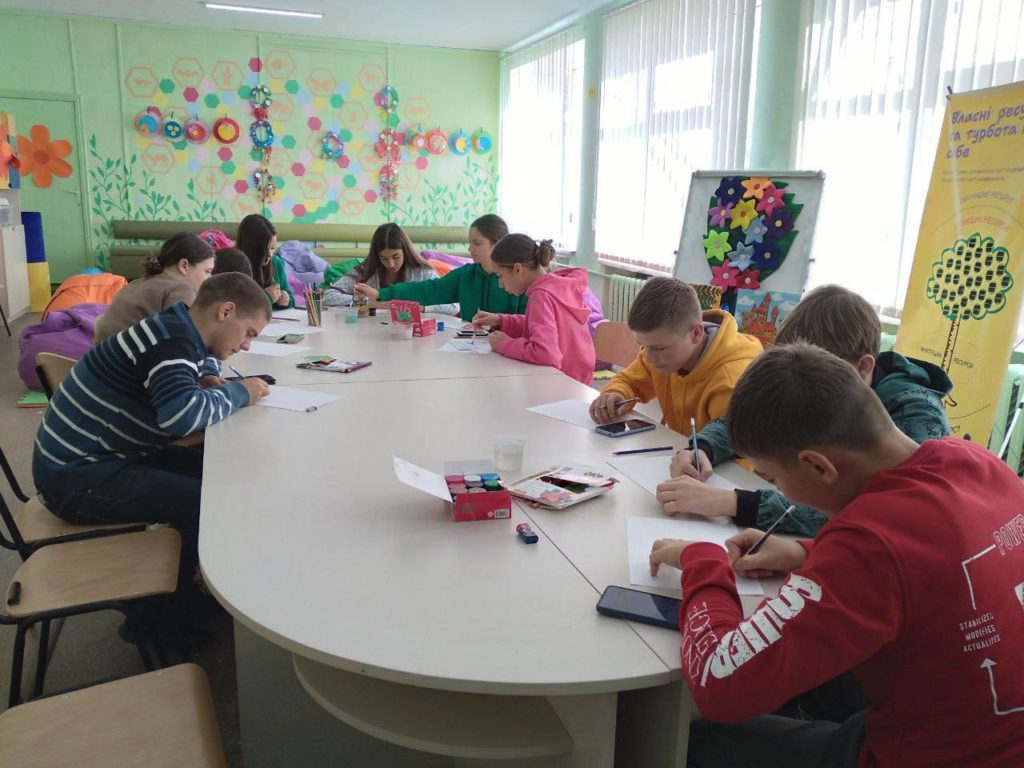
In the early afternoon, we piled into our car and began another trip to our next destination on this Solidarity Pilgrimage. My thoughts turned to the prayerful reflection offered by Pope Francis two days before: “Like the Good Samaritan, we are called to be neighbors to all the wayfarers of our time, to save their lives, to heal their wounds and to soothe their pain. For many, tragically, it is too late, and we are left only to weep over their graves, if they even have a grave … Yet the Lord knows the face of each of them, and he does not forget it … Let us ask the Lord for the grace to draw close to all migrants and refugees who knock at our door, because today “anyone who is neither a robber nor a passer-by is either injured himself or bearing an injured person on his shoulders.” (Fratelli Tutti, 70).” Moment of Prayer for Migrants Refugees, offered by Pope Francis in St. Peter’s Square, 19 October 2023.


